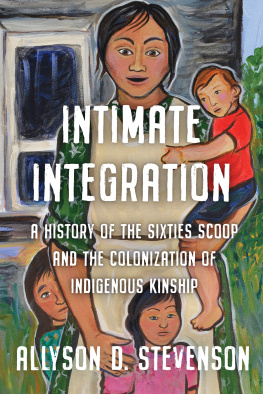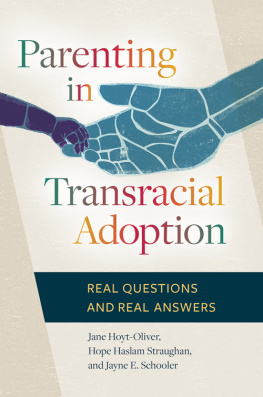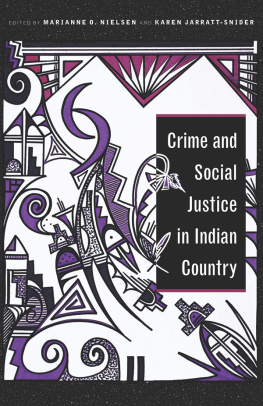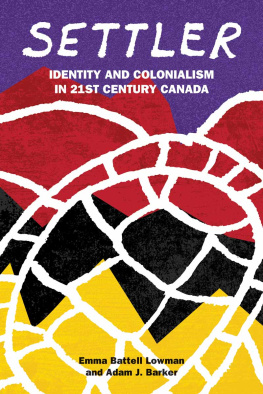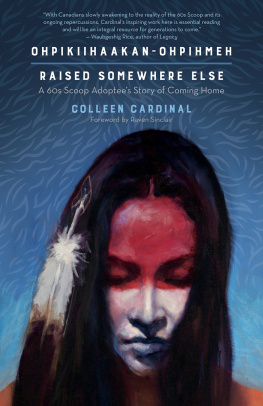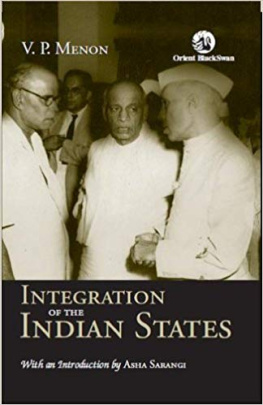Intimate Integration
A History of the Sixties Scoop and the Colonization of Indigenous Kinship
ALLYSON D. STEVENSON
UNIVERSITY OF TORONTO PRESS
Toronto Buffalo London
University of Toronto Press 2021
Toronto Buffalo London
utorontopress.com
Printed in Canada
ISBN 978-1-4875-0064-1 (cloth)ISBN 978-1-4875-1152-4 (EPUB)
ISBN 978-1-4875-2045-8 (paper)ISBN 978-1-4875-1151-7 (PDF)
___________________________________________________________________________
Library and Archives Canada Cataloguing in Publication
Title: Intimate integration : a history of the Sixties Scoop and the colonization of Indigenous kinship / Allyson D. Stevenson.
Names: Stevenson, Allyson D., 1976 author.
Series: Studies in gender and history ; 51.
Description: Series statement: Studies in gender and history ; 51 | Includes bibliographical references and index.
Identifiers: Canadiana (print) 20200195956 | Canadiana (ebook) 20200196006 | ISBN 9781487500641 (cloth) | ISBN 9781487520458 (paper) | ISBN 9781487511524 (EPUB) | ISBN 9781487511517 (PDF)
Subjects: LCSH: Canada. Indian Act. | LCSH: Interracial adoption Canada. | LCSH: Child welfare Canada. | CSH: Native children Canada Social conditions. | CSH: Native peoples Kinship Canada. | CSH: Native peoples Relocation Canada. | CSH: Native peoples Canada Government relations.
Classification: LCC HV875.7.C2 S74 2020 | DDC 362.734089/97071dc23
___________________________________________________________________________
Cover illustration: Maashkowishiiw She is strong, Sherry Farrell Racette, 2015, acrylic on canvas. A story painted from a story told of a story heard a childs memory through an elders voice a womans courage as she faces aggressive men who threaten her family. She flees up into the hills and watches as her house burns. She makes her way to Manitoba where she rebuilds and raises her children. Not a victim. A warrior-mother. This painting is from the project From Here: Story Gatherings from Regina and the QuAppelle Valley, a series of paintings based on conversations with Mtis elders, commissioned by the Gabriel Dumont Institute.
This book has been published with the help of a grant from the Federation for the Humanities and Social Sciences, through the Awards to Scholarly Publications Program, using funds provided by the Social Sciences and Humanities Research Council of Canada.
University of Toronto Press acknowledges the financial assistance to its publishing program of the Canada Council for the Arts and the Ontario Arts Council, an agency of the Government of Ontario.

Acknowledgments
I first acknowledge the lands in Treaty 6 territory where I live, and Treaty 4 territory where I work. I am grateful to raise my children in the original homeland of the Mtis people, our ancestors, with the knowledge of their kinship relations and their connection to our homeland.
This project originated with a question that bubbled up while I was working on my MA on Mtis interpreters of the numbered treaties. As a student of Dr Jim Miller, whose work on the residential schools transformed Canadian historical scholarship, I wondered about Indigenous experiences of child welfare and adoption. With only a dim understanding of this potential question, I put it off until a much later date. In 2002 few people had connected child welfare, adoption, and government policy as a policy of Indigenous assimilation. In the time that has elapsed, at the insistence of survivors, the Sixties Scoop has emerged alongside the residential schools as another government-orchestrated policy of Indigenous elimination. I am grateful to the elders, survivors, and leaders who have shared their stories with me and continue to pursue justice for families affected.
My deep gratitude goes out to my early professors in the Department of History at the University of Saskatchewan, especially Dr Jim Miller and Dr Martha Smith-Norris, who were the first to see potential in me as an undergraduate student. My PhD supervisor, Valerie Korinek, demonstrated her confidence in me, and through her deep and abiding belief in the power of women supporting women, I was able to navigate through motherhood and PhD life and thrive. I will always value the time she invested in supporting me and my research. I am also grateful for the encouragement of Karen Dubinsky, my external PhD examiner, who insisted that I submit a manuscript to the Gender and History Series. My post-doctoral supervisor, Dr Catherine Carstairs, enthusiastically embraced me at the University of Guelph, read over the early manuscript, and offered much helpful advice. Kim Anderson and her family were gracious hosts while I was in Guelph, providing me with a friendly space and great conversation.
I am especially grateful for all the support from the University of Toronto Press, and the warm conversations with Len Husband. From the outset, this process has been made much more enjoyable with the supportive and always engaging editors. I am very thankful for the staff of the Provincial Archives of Saskatchewan, formerly the Saskatchewan Archives Board, especially Bonnie Dahl, Christine Charmbury, Tim Novak, Nadine Charabin, and all those behind the scenes who photocopied countless memos, digitized images, and undertook the tedious task of redacting files for the countless restricted access files I requested.
I am especially thankful for the important meeting and ceremony with Elder and Knowledge Keeper Peter Nippi at Kinisin First Nation at the very start of my research. It was his valuable insight into the importance of kinship upon which I framed this research and writing. Along the way I have benefited from intellectual conversations with Brenda Macdougall, who first alerted me to the collection of Adopt Indian and Mtis commercials in the archives, and was an early external on my PhD committee. I was directed to pursue research on Indigenous children following the presentation by Sherry Farrel Racette at Congress 2007 at the University of Saskatchewan. Tara Turner and Cheryl Troupe of the Mtis Nation-Saskatchewan also were instrumental in facilitating connections in the Mtis community. My panel at the Berks Conference of Womens Historians with Margaret Jacobs, Amy Lonetree, Erica Newman, Shurlee Swain, Katrina Jagodinsky, Denise Cuthbert, Tara Briggs, and Karen Dubinsky all assisted in developing my analysis of transracial adoption and the Sixties Scoop. The staff and elders at the Marguerite Riel Centre, especially Director Joanne Yakowec, have always had an open door for me to visit, and learn.
From when I began this research until now, one constant has been the love and support of my family. We have all changed profoundly since this project first began as my children grew from little kids to adults, and my babies went from toddlers to teens. Without their love, this could never have been possible. Their patience and kindness provided me with the strength to carry on when I thought it was just too difficult. My husband, Tyler, has been by my side the whole way through, encouraging me and supporting me as I grappled with all the demands of a gruelling academic career and the personal struggles of being an adoptee. My in-laws Merrill and Carol Stevenson always saw the importance of this research and spent many hours looking after children, driving kids to hockey and music lessons, picking people up from school, and providing endless amounts of love and support. They gave up much of their time and leisure hours so I could publish this research and pursue my dreams. My parents were the first to plant the seeds of aiming high and always pursuing my passion. I know that they often wondered what I was doing and where this was all going. I knew from a young age that I could be whatever I wanted to be. While the journey home has been both fraught and deeply satisfying, it has enabled me to connect with my family of origin and homeland.

